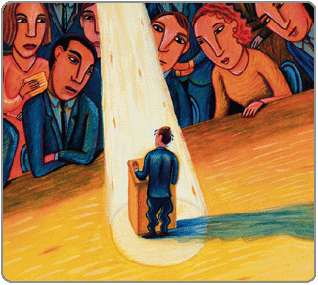According to most studies, people’s number one fear is public speaking. Number two is death. Death is number two. Does that seem right? That means to the average person, if you have to go to a funeral, you’re better off in the casket than doing the eulogy.
-Jerry Seinfeld
When we think about Jerry Seinfeld, what comes to mind? Funny guy, good t.v. show, maybe some of us will even think about his classic hair style (back in the good old days of the mullet). Would anyone ever make the claim to call him an insightful genius of human nature and our fears? Probably not, but while this quote of his may seem a bit of an absurd statement at first, he’s actually on to something. Shockingly, this bit, taken from Jerry’s standup, is actually based in fact. In 1977 David Wallechensky, Irving Wallace, and Amy Wallace published a book simply called The Book of Lists. This book, as the name suggests, was made up of of lists, everything from the worst places to hitchhike, to people misquoted by Ronald Reagan, and yes, even a list of the 14" worst" human fears. This list was put together by a team of market researchers, asking 3000 U.S. inhabitants a simple question, “what are you most afraid of?” What makes Jerry Seinfeld’s quote even more surprising is that according to this list, death is even lower than originally thought. In fact it doesn’t come in until number 7. Below is the full list, organized by percentage of answers.
- Speaking before a group 41%
- Heights 32%
- Insects and Bugs 22%
- Financial Problems 22%
- Deep Water 22%
- Sickness 19%
- Death 19%
- Flying 18%
- Loneliness 14%
- Dogs 11%
- Driving/Riding in a Car 9%
- Darkness 8%
- Elevators 8%
- Escalators 5%
What is most interesting to me about this list isn’t what’s on it, but more so what is actually missing from it. Fears such as home invasion, starvation, or rape seem to be missing, and instead we find fear of darkness, escalators, and even public speaking. This speaks not to what we fear, but more so the relevance of our fears to our daily lives. When presented with a question as broad as “what are you most afraid of” we are naturally inclined say the first great fear that jumps into our mind. With this being said, it seems as though our “greatest fear” isn’t the one with the highest stakes, or the last thing we would want to happen in our lives (seriously who would actually rather die than speak in front of an audience,) but rather the most relevant fear that we could see actually happening to us.

You made a great point and really opened my eyes up to how our privileges come out in different ways. I guess in our society, we live a more "day by day" life style and less "big picture", so having our biggest fears be public speaking would be something that would happen to an individual in this society daily. Like you said in the post, financial problems is more feared than starvation, while in other countries who already have to deal with financial problems are more concerned with how they will live to see the next day. Maybe they are living the "day- to-day" life style?
ReplyDeleteThis is a really intriguing topic! It's crazy how we're more afraid of things like dogs and escalators where really threatening circumstances, like starving and rape, aren't really the first things that come to mind when we think about what scares us. I feel like a lot of it has to do with the media, too. The movies we watch warn us about monsters lurking in the; we always see people react to a spider by jumping back and screaming. By constantly reinforcing how threatening these fears seem, these are the only things we think about being really afraid of.
ReplyDeleteThis comment has been removed by the author.
ReplyDeleteThis comment has been removed by the author.
ReplyDeleteFirst and foremost, "Death or Public Speaking- Which Would You Prefer?" is exemplary post in which the supporting details and word choice successfully promote the presented argument. It prompts questions concerning where our fears actually lie and how our interactions within reality influence our perceptions. That being said, I would like to state that I am certainly in agreement with the prospect that style of living impacts our daily thought processes. Acknowledged fears are often what we conceive to be the most likely to occur in our day to day lives.One segment that I would like to address is the proposal that the listing of certain "fears" as lower indicates that the object fails to manifest itself in our lives as much as those objects listed higher up. One can think of a concept such as death and not be terrified of it for instance. After all, to die is a natural part of the cycle of life thus an individual such as myself would certainly place public speaking above death in the list. Nevertheless, I enjoyed the article and hope you continue to analyze such psychological matters.
ReplyDeleteI had to delete my previous post due to a grammatical error that was driving me crazy.
DeleteI've never thought of these list of fears as privileges. This really opened my eyes to what we take for granted. Many times in our life we just think about specific moments, a talk in school or being alone, and we get terrified of those. We don't think about dying everyday because a lot of us don't have to worry about dying because we live in a safer society. It's crazy to think about how in some countries the only thing people are thinking about is if they will survive the night or if their family will survive. This blog post really makes you think about what kind of privileged life your living.
ReplyDelete